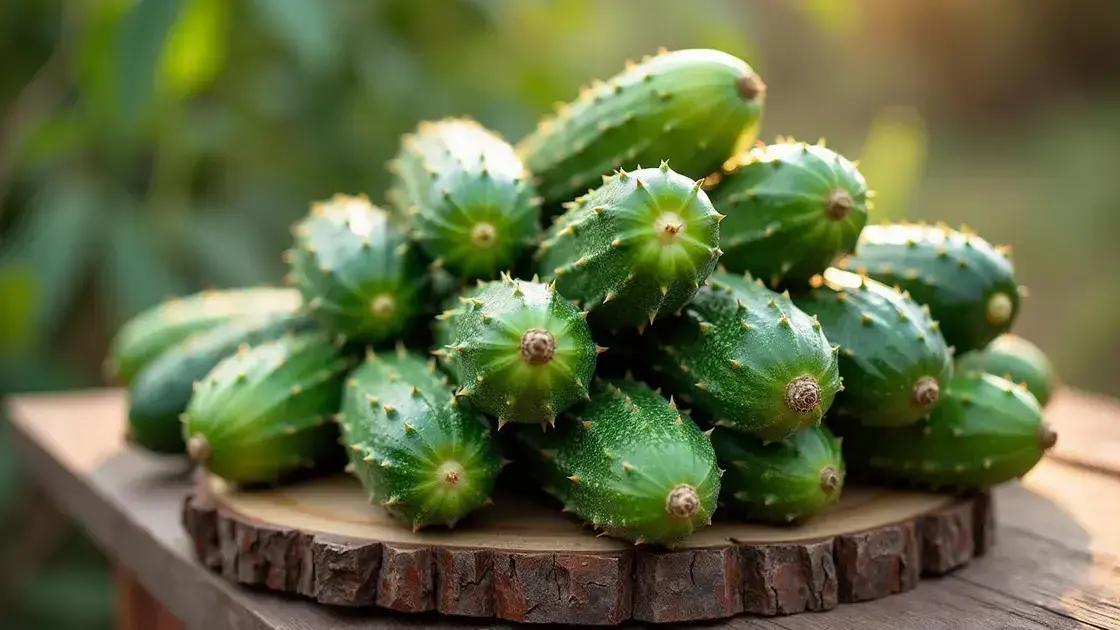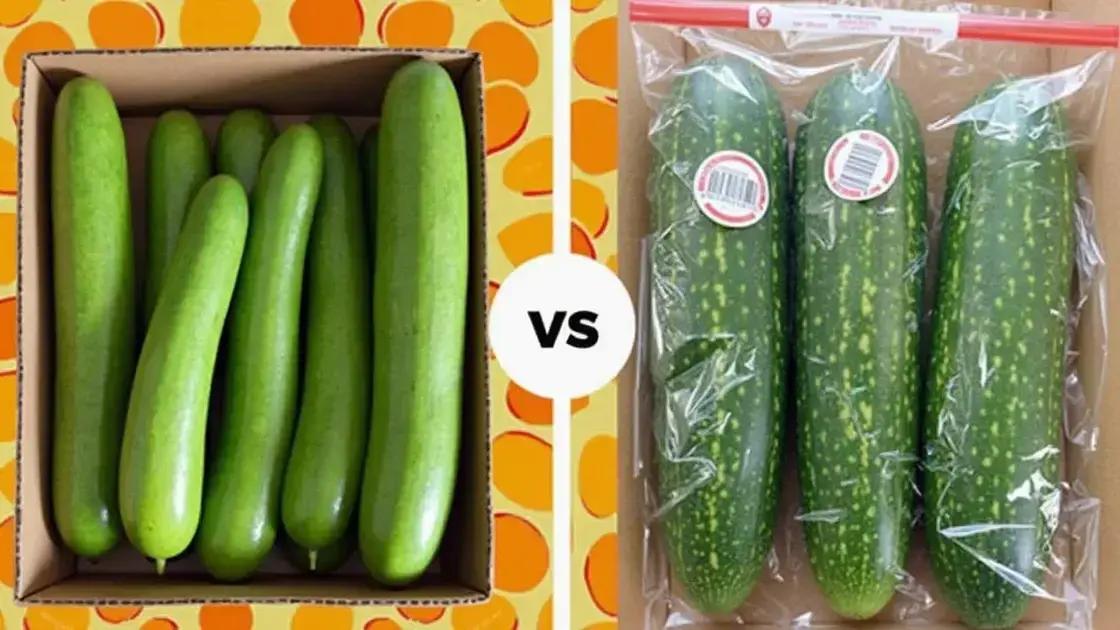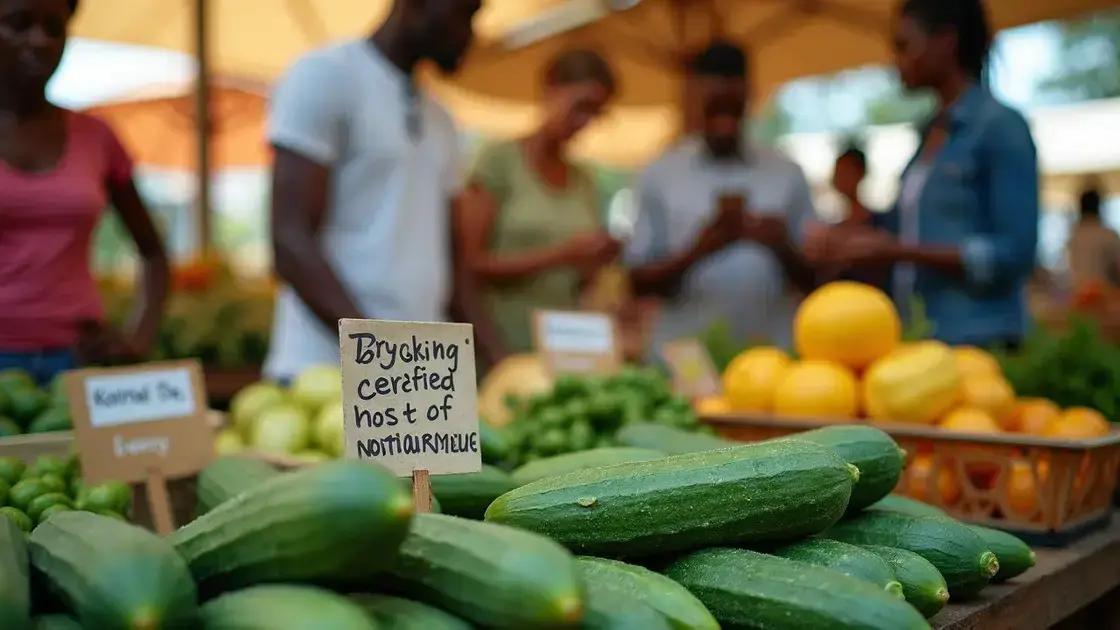An African cucumber is a unique fruit known for its spiky yellow or orange skin and green jelly-like flesh, offering numerous health benefits. To ensure authenticity, look for signs of counterfeiting, such as poor packaging or unusual colors, and buy from trusted sources like farmers’ markets or specialty stores. Remember to check for quality certifications and inspect the product for freshness before purchasing.
Are you aware of the African cucumber? This unique fruit offers numerous health benefits, but counterfeit products can be misleading. Spotting these fakes is crucial for ensuring you get the quality and nutrition that African cucumber promises. In this article, we will provide you with essential tips on identifying real African cucumbers, including signs of counterfeiting, advice for purchasing, and where to find trusted sources.
What is African Cucumber?

African cucumber, also known as African horned cucumber or kiwano, is a unique fruit that originates from Africa. It has a spiky orange or yellow skin and is filled with a green, jelly-like flesh. This fruit is not only visually striking but also packed with nutrients.
The African cucumber is rich in vitamins, antioxidants, and fiber, making it a great addition to a healthy diet. It has a mildly sweet taste, somewhat resembling a combination of cucumber and kiwi. The fruit can be eaten raw, blended into smoothies, or used in salads.
Despite its many benefits, the demand for African cucumber has led to the rise of counterfeit products. Recognizing a genuine African cucumber is vital for your health and culinary experience. This article will guide you in spotting counterfeit products so you can enjoy the real fruit.
Where is African Cucumber Grown?
African cucumber is primarily grown in various regions across Africa, especially in countries like South Africa, Zambia, and Kenya. However, it is also cultivated in some parts of California and New Zealand, where the climate is favorable.
Uses of African Cucumber
This versatile fruit is used in many culinary dishes. Its unique texture makes it perfect for salads, while its flavor can enhance smoothies and desserts. It can also be used in jellies or as a garnish on various dishes, taking advantage of its eye-catching appearance.
Common Counterfeit Signs to Look For

Spotting counterfeit African cucumbers requires careful observation. Here are some common signs to help you identify fake products.
1. Poor Quality Packaging
Genuine African cucumbers often come in high-quality packaging with clear labeling. If the packaging looks cheap, faded, or poorly printed, it may be a counterfeit.
2. Unusual Color and Shape
Authentic African cucumbers should have a vibrant spiky orange or yellow skin. If you notice cucumbers that are significantly different in color or have an odd shape, they might be fake.
3. Smell and Texture
Real African cucumbers have a fresh, fruity scent. If the cucumber has no smell or smells spoiled, it is likely not genuine. Moreover, the texture should feel firm yet slightly yielding. A mushy or overly hard cucumber is a red flag.
4. Lack of Nutritional Information
Counterfeit products often skip important details on their nutrition facts. If the label lacks essential information or certifications, don’t purchase it.
By being aware of these signs, you can make informed decisions and avoid counterfeit African cucumbers. Always prioritize quality and authenticity when purchasing this unique fruit.
Tips for Buying Genuine African Cucumber

When buying genuine African cucumbers, keep these tips in mind to ensure you’re getting the real deal.
1. Buy from Reputable Sources
Always purchase African cucumbers from trusted stores or farmers’ markets. Look for vendors with positive reviews and a good reputation for quality.
2. Check for Certifications
Many authentic products have certifications that guarantee their quality. Look for labels that indicate organic or quality certifications, ensuring you’re buying genuine fruit.
3. Ask Questions
Don’t hesitate to ask vendors about their sourcing practices. Asking where and how the cucumbers are grown can help you learn more about the product.
4. Inspect the Product
Carefully examine the cucumbers. Look for a firm texture and vibrant color. Avoid any cucumbers that show signs of damage or are overly soft.
5. Purchase in Season
Buying African cucumbers when they are in season increases the chance of getting fresh and authentic products. Off-season fruits may be less reliable.
By following these tips, you can confidently purchase genuine African cucumbers and enjoy their unique flavors and health benefits.
Where to Buy Trusted African Cucumber

Finding trusted sources to buy African cucumbers is vital to ensure quality and authenticity. Here are some reliable places to consider:
1. Local Farmers’ Markets
Visiting farmers’ markets is a great way to find fresh African cucumbers. You can talk directly to farmers and ask about their growing practices.
2. Specialty Grocery Stores
Look for specialty grocery stores that focus on organic or international products. These stores often carry authentic African cucumbers and may provide more information about their sourcing.
3. Online Organic Retailers
Many online retailers specialize in organic produce and can ship African cucumbers straight to your door. Ensure the retailer has good reviews and a solid reputation for quality.
4. Community Supported Agriculture (CSA)
Joining a CSA program can provide access to fresh produce, including African cucumbers. This option connects you directly with local farmers.
5. Ethnic Grocery Stores
Check ethnic grocery stores that cater to African or international cuisines. These stores often carry authentic products that are hard to find elsewhere.
By exploring these options, you can find trusted sources for purchasing high-quality African cucumbers easily.
In Summary: Purchase African Cucumbers with Confidence
Buying authentic African cucumbers is essential for enjoying their unique flavor and health benefits. By understanding what African cucumbers are and recognizing common counterfeit signs, you can make informed choices.
Utilizing the tips for purchasing genuine products will lead you to trusted sources. Whether you opt for farmers’ markets, specialty grocery stores, or online retailers, you can find quality cucumbers without worry.
By following the guidelines presented in this article, you will ensure that you are enjoying the best of what African cucumbers have to offer while avoiding counterfeit products.
FAQ – Frequently Asked Questions about African Cucumbers
What is an African cucumber?
The African cucumber, also known as kiwano, is a unique fruit with a spiky yellow or orange skin and green jelly-like flesh.
How can I spot counterfeit African cucumbers?
Look for signs like poor packaging, unusual color and shape, absence of smell, and lack of nutritional information to identify counterfeit products.
Where can I buy genuine African cucumbers?
You can find trusted African cucumbers at local farmers’ markets, specialty grocery stores, online organic retailers, and ethnic grocery shops.
What are some tips for buying African cucumbers?
Purchase from reputable sources, check for certifications, ask vendors questions, inspect the product, and buy in season.
What health benefits do African cucumbers provide?
African cucumbers are rich in vitamins, antioxidants, and fiber, making them a great addition to a healthy diet.
How do I know if an African cucumber is fresh?
A fresh African cucumber should feel firm, have a vibrant color, and emit a fruity scent. Avoid those that are mushy or have damaged skin.













